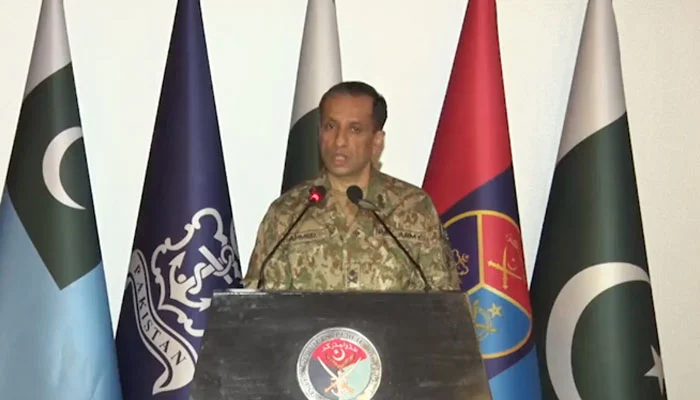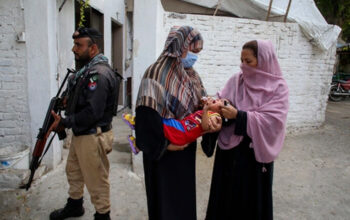By Staff Reporter
ISLAMABAD: The Pakistan military on Tuesday said it does not endorse any specific political party or ideology and remains committed to prioritizing the country’s security.
Major General Ahmed Sharif Chaudhry, Director General of the military’s media wing Inter-Services Public Relations (ISPR), said the military remains committed to its role as a national institution and holds all politicians and political parties in high regard.
“As far as politics is concerned, Pakistan’s army is a national army, and all politicians and political parties are respectable to us. We do not want the army to lean towards any specific political ideology, vision, or party, and we believe that neither do you,” Chaudhry said in his maiden news conference.
“If any country’s army is used to favor a specific political ideology or religion or vision then it has only led to chaos — this is a reality.”.
The Pakistan military has a long history of involvement in the country’s politics, having seized power through coups on several occasions in the 75-year history of the country.
The briefing was held at a time when the country is facing political turmoil and tension between the government and the opposition party of former prime minister Imran Khan particularly ahead of the general elections scheduled for later this year.
Since the ouster of ex-prime minister Khan in a parliamentary no-trust vote in April last year, the Pakistani military establishment, particularly former army chief General Qamar Javed Bajwa, has been widely called out by Khan and his supporters for meddling in the political affairs of the country.
In his farewell speech last year, General Bajwa dismissed Khan’s allegations against him as “fake and false,” but admitted it was the military’s “illegal” and “unconstitutional” interference in politics in the past that had invited criticism.
He stressed the army would no longer play any role in national politics moving forward.
General Chaudhry said it was inappropriate to politicize the army’s relationship with the government.
Khan’s criticism sparked a public debate about the role of the military in Pakistani politics, particularly resonating with young, social-media-savvy Pakistanis, who came out in fierce condemnation of what they deemed the military’s meddling in politics.
Chaudhary stressed the army did not want to engage in “useless discussions” that would divert its attention from security operations, saying whatever was being posted online about the Pakistani forces was “unconstitutional.”
“We think the talks on social media against the army, institutions, and their officeholders are not only irresponsible and unwise but unconstitutional,” he said.
“We give importance to constructive criticism, but we find it important to say that like any other army, the Pakistan Army can’t be pressured by falsehood and force.”
In response to questions about criticism from organizations comprising military veterans and the arrest of a former lieutenant general, the DG ISPR said veterans organizations were supposed to look after the welfare issues of retired military personnel and were not political or commercial organizations.
“Being a veteran does not mean you are immune from the law. Organisations comprising veterans similarly should not wear a political garb.”
The spokesman distanced the military from the previous government’s initiative of holding dialogue with the banned Tehreek-i-Taliban Pakistan (TTP).
Chaudhry said, “Holding dialogue with the banned TTP was the decision of the then-government of Pakistan and they have openly admitted this as well”.
“The relationship between the army and the terrorists is only of kinetic operations, which would continue until the eradication of terrorism.”
General Chaudhry also provided statistics on the ongoing intelligence-based operations carried out by the country’s security forces.
A total of 8,269 operations were conducted this year, resulting in the successful capture or elimination of 1,525 terrorists.
Many of these operations, numbering 3,531, took place in the province of Khyber Pakhtunkhwa, where 159 terrorists were either killed or captured. Meanwhile, 119 operations were carried out in Punjab, and 519 operations were conducted in Sindh.
Chaudhry said 137 security personnel were killed, and 117 were injured in anti-terror operations this year.
“To rid the country of terrorism, more than 70 operations are conducted daily,” he added.
Copyright © 2021 Independent Pakistan | All rights reserved




